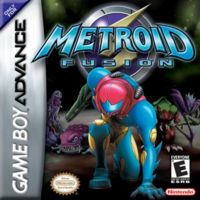Metroid Fusion

| |
| Metroid Fusion | |
| Full Title | Metroid Fusion |
| Developer | Nintendo |
| Publisher | Nintendo |
| System | Game Boy Advance, Virtual Console (3DS, Wii U) |
| Release Date | Game Boy Advance US November 17, 2002 EU November 22, 2002 JP February 14, 2003 3DS Virtual Console December 15/16, 2011 (Ambassador) Wii U Virtual Console US/EU April 3, 2014 JP April 30, 2014 |
| Genre | Action/Adventure |
| Gallery | GH Gallery |
| Rating | ESRB: E |
Metroid Fusion is the fifth Metroid game and the first Metroid game on the Game Boy Advance. Fusion acts as a sequel to Super Metroid and features a different suit for Samus..
Story
Samus Aran has been infected by the X Parasite after answering a call from the Biologic Space Laboratories orbiting SR388. To save her life, she was injected with Metroid DNA and most of her power suit has to be removed. This results in her gaining a new Fusion Suit and the ability to absorb defeated X Parasites. Upon recover, Samus sets off to exterminate the parasites and eliminate the threat they pose. However, she is being stalked by a powerful form of the X parasite taking the form of herself called SA-X. Having lost more of her equipment and abilities during the procedure, Samus must gain enough strength to oppose the SA-X.
Gameplay
Metroid Fusion is divided into seven different levels, each containing its own habitat, and it is played in a more linear level compared to past Metroid games. It also has more dialogue, as Samus receives information from a computer throughout the game. The player must travel through the levels to obtain equipment and abilities (a mix of old and new ones) in order to progress. The game also contains stealth and chase segments in which Samus must avoid the SA-X, as it is impossible to beat her until close to the end of the game.
The game also has a connectivity feature. When connected with Metroid Prime, the Fusion suit is unlocked in Prime and Metroid becomes available. When connected with Metroid: Zero Mission, extra artwork is unlocked in Zero Mission.
Version Differences
When Fusion was released in Japan, the official site included an exclusive e-Manga that chronicled Samus's life from childhood to her becoming a bounty hunter. Because of that, many of the ending scenes in the Japanese version show Samus with different backdrops showing her in her younger years, each one different depending on completion difficulty and time. Because the e-Manga never officially made it outside of Japan, these exclusive ending scenes were not viewable in other versions of the game.
Continuity Notes
- The instruction manual condenses the history of the previous three games and connects them to Fusion.
- The DNA of the Metroid hatchling, which had appeared in Metroid II: Return of Samus and Super Metroid, is an important plot point due to it being injected into Samus and the later revelation that the DNA was also being used to clone new Metroids.
- The sectors of BSL are also modeled after environments from SR388, as another callback to Metroid II, although the sectors do not bear specific resemblances to the areas seen within that game. An Omega Metroid from the game does make an appearance.
- The same Etecoons and Dachoras from Super Metroid reappear, and once more Samus helps them escape an explosion in her ship.
Legacy
Ports and Remakes
- In 2011, Metroid Fusion was part of the set of Game Boy Advance games that were released for free download on the 3DS to those participating in the Ambassador Program. It did not receive a standard eShop release on the 3DS, but it was later released for the Wii U as part of the Wii U Virtual Console in 2014.
- In March 2023, it was added to the library of Game Boy Advance games that can be played on the Nintendo Switch by subscribers of the Nintendo Switch Online's Expansion Pack service.
Sequels
For nearly two decades, no Metroid game was released that continued past the events of Fusion, and it stood as the final game in the series in chronological order throughout that time period. Fusion was launched within the same timeframe as Metroid Prime, which spawned its own series. The next traditional Metroid game was the remake Metroid Zero Mission, and Metroid: Other M later served as an interquel between Super Metroid and Metroid Fusion. In 2021, Fusion finally received a sequel in the form of Metroid Dread for the Nintendo Switch.
| Titles in the Metroid Series |
|---|
| Metroid (Zero Mission) - Return of Samus (3DS) - Super Metroid - Other M - Fusion Metroid Prime - Pinball - Echoes - Hunters - Corruption - Federation Force - 4 Metroid Dread |